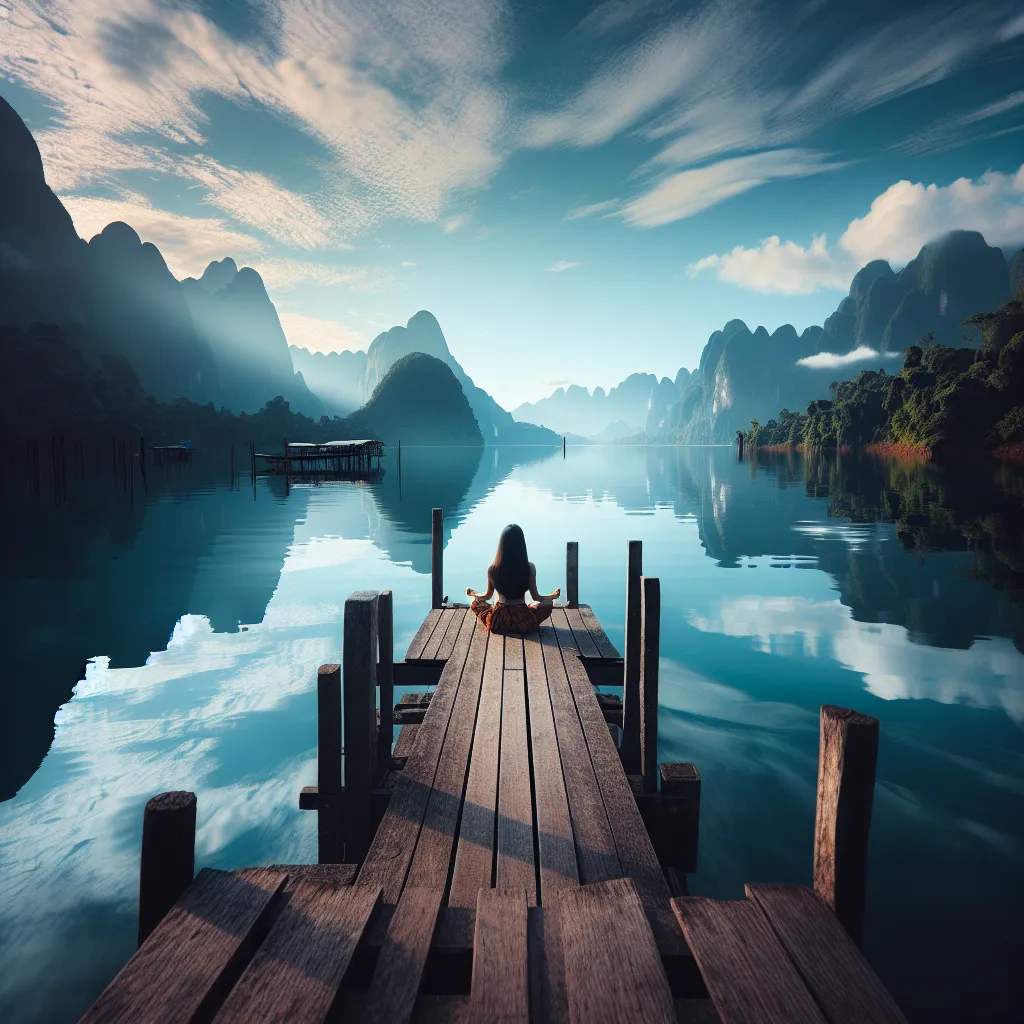As an experienced IELTS examiner, I’ve seen countless candidates struggle with the speaking section, particularly when asked to describe a place where they had a peaceful and relaxing experience. This topic is a perennial favorite among examiners and has appeared in various forms in past IELTS tests. It’s likely to continue being a popular choice in future exams due to its versatility and ability to elicit a range of vocabulary and expressions.
 Serene lakeside retreat
Serene lakeside retreat
Let’s dive into how you can ace this topic and impress your examiner with a well-structured, vocabulary-rich response.
Part 1: Introduction and Interview
In this section, the examiner may ask you some general questions about relaxation and peaceful experiences. Here are some potential questions and sample answers:
Q: Do you find it easy to relax?
Band 6-7 Answer:
Yes, I do find it relatively easy to relax. I have a few activities that help me unwind, like reading a book or taking a walk in the park.
Band 8-9 Answer:
Absolutely, I’ve developed quite an effective repertoire of relaxation techniques over the years. Whether it’s immersing myself in a captivating novel, indulging in a leisurely stroll through nature, or practicing mindfulness meditation, I find I can effortlessly transition into a state of relaxation.
Q: What do you usually do to relax?
Band 6-7 Answer:
To relax, I usually listen to soft music or spend time in my garden. These activities help me forget about my worries and feel calm.
Band 8-9 Answer:
I have a diverse array of relaxation methods that I employ, depending on my mood and circumstances. My go-to activities include immersing myself in soothing classical music, which I find tremendously calming, or tending to my garden, which allows me to connect with nature and clear my mind. Additionally, I often practice deep breathing exercises or gentle yoga, which I find incredibly effective in alleviating stress and promoting a sense of inner peace.
Part 2: Long Turn (Cue Card)
Here’s a sample cue card related to describing a peaceful and relaxing experience:
Describe a place where you had a peaceful and relaxing experience
You should say:
- Where this place was
- When you went there
- What you did there
- And explain why you found it peaceful and relaxing
Band 6-7 Sample Answer:
I’d like to talk about a beach I visited last summer. It’s a small, secluded beach about two hours from my hometown. I went there with a few friends for a weekend getaway.
When we arrived, I was immediately struck by how quiet and beautiful it was. The sand was clean and white, and the water was a clear blue. There weren’t many people around, which made it feel very private.
During our stay, we spent most of our time relaxing on the beach. We swam in the sea, read books under umbrellas, and had picnics on the sand. In the evenings, we sat around a small bonfire and talked.
I found this place peaceful and relaxing for several reasons. Firstly, the natural beauty was calming. The sound of the waves and the sea breeze helped me forget about my daily stresses. Also, being away from the city and technology allowed me to disconnect and truly unwind. The slow pace of life there was a welcome change from my usual busy routine.
Overall, this beach trip was exactly what I needed to recharge and feel refreshed. It’s a place I often think about when I need to relax.
Band 8-9 Sample Answer:
I’d like to recount my experience at a tranquil mountain retreat I visited last autumn. This idyllic sanctuary was nestled in the heart of the Alps, about a three-hour drive from my bustling city life.
Upon arrival, I was immediately captivated by the breathtaking panorama that unfolded before me. The retreat was perched on a hillside, overlooking a vast expanse of pristine wilderness. The air was crisp and invigorating, filled with the scent of pine and wild herbs.
During my stay, I immersed myself in a variety of rejuvenating activities. I embarked on leisurely hikes through verdant forests, pausing occasionally to marvel at the majestic views or to observe the local wildlife. In the mornings, I partook in outdoor yoga sessions, syncing my breath with the rhythmic sounds of nature. The evenings were spent indulging in farm-to-table cuisine and engaging in thought-provoking conversations with fellow guests around a crackling fireplace.
This retreat proved to be an oasis of tranquility for several reasons. Firstly, the sheer beauty of the natural surroundings had a profoundly calming effect on my psyche. The absence of urban noise and the omnipresence of natural sounds – from the gentle rustling of leaves to the distant calls of birds – created a soothing auditory landscape. Moreover, the deliberate lack of modern distractions, such as television and constant internet connectivity, allowed me to truly disconnect from the demands of my everyday life and reconnect with myself.
The unhurried pace of life at the retreat stood in stark contrast to my usual frenetic schedule, providing a much-needed opportunity to slow down and practice mindfulness. The combination of physical activity, healthy eating, and mental relaxation left me feeling thoroughly rejuvenated and centered.
In retrospect, this mountain retreat epitomized the concept of a peaceful and relaxing experience for me. It served as a powerful reminder of the restorative powers of nature and the importance of occasionally stepping back from our hectic lives to find inner calm and perspective.
Follow-up Questions:
- How often do you visit peaceful places like this?
- Do you think cities can have peaceful and relaxing spots?
- How important is it for people to have relaxing experiences regularly?
Part 3: Two-way Discussion
In this section, the examiner will ask more abstract questions related to the topic. Here are some potential questions and sample answers:
Q: Why do you think some people find it difficult to relax in today’s society?
Band 6-7 Answer:
I think many people find it hard to relax because of the fast-paced nature of modern life. There’s always something to do or worry about, like work deadlines or social obligations. Also, technology keeps us connected all the time, which can be stressful.
Band 8-9 Answer:
The inability to relax in contemporary society can be attributed to a multitude of factors. Primarily, the frenetic pace of modern life, characterized by incessant demands on our time and attention, creates a perpetual state of alertness. This is exacerbated by the ubiquity of technology, which, while ostensibly designed to simplify our lives, often results in a constant barrage of notifications, emails, and social media updates, making it challenging to disengage.
Moreover, there’s an increasing societal pressure to be productive at all times, which can lead to guilt or anxiety when attempting to relax. The blurring of boundaries between work and personal life, especially in the era of remote work, further compounds this issue. Additionally, financial stresses, information overload, and global concerns broadcasted 24/7 through various media channels contribute to a pervasive sense of unease that many find difficult to shake off.
Q: How do you think the concept of relaxation differs across cultures?
Band 6-7 Answer:
I believe relaxation can mean different things in different cultures. For example, in some countries, relaxation might involve active pursuits like sports or socializing, while in others it might be more about quiet contemplation or meditation. Cultural values and traditions play a big role in shaping these differences.
Band 8-9 Answer:
The concept of relaxation is undeniably influenced by cultural norms, values, and traditions, resulting in a diverse spectrum of relaxation practices across different societies. In many Western cultures, relaxation often revolves around leisure activities, such as watching television, reading, or engaging in hobbies. There’s also a growing trend towards mindfulness practices borrowed from Eastern traditions.
In contrast, many Eastern cultures have long-standing traditions of relaxation deeply rooted in spiritual practices. For instance, the Japanese concept of “shinrin-yoku” or forest bathing, which involves immersing oneself in nature, is considered a form of relaxation and therapy. Similarly, meditative practices in Indian culture, such as yoga and pranayama, are integral to their approach to relaxation and well-being.
Some cultures prioritize communal relaxation, where spending time with family and friends is seen as the ultimate form of unwinding. This is evident in the Spanish siesta tradition or the Italian concept of “dolce far niente” – the sweetness of doing nothing.
It’s also worth noting that the very definition of relaxation can vary. In some high-achieving societies, relaxation might be viewed as unproductive or even indulgent, while in others, it’s seen as essential for maintaining balance and well-being.
Understanding these cultural differences is crucial in our increasingly globalized world, as it fosters empathy and prevents misinterpretation of behaviors across cultures.
Key Vocabulary and Phrases for High Scores
-
Tranquil (/ˈtræŋkwɪl/) – (adj) calm and peaceful
Example: The tranquil atmosphere of the mountain retreat helped me relax instantly. -
Serene (/səˈriːn/) – (adj) calm, peaceful, and untroubled
Example: The serene lake reflected the mountains like a mirror. -
To unwind (/ʌnˈwaɪnd/) – (v) to relax after a period of work or tension
Example: After a stressful week, I like to unwind by taking long walks in nature. -
Rejuvenating (/rɪˈdʒuːvəneɪtɪŋ/) – (adj) making one feel younger, more vital, or refreshed
Example: The spa treatment was incredibly rejuvenating, leaving me feeling refreshed and energized. -
Oasis of calm (/ˈəʊeɪsɪs əv kɑːm/) – (phrase) a peaceful place or situation within a busy or chaotic environment
Example: The botanical garden in the city center is an oasis of calm amidst the urban hustle. -
To recharge one’s batteries – (idiom) to rest and relax in order to restore one’s energy
Example: I took a weekend trip to the countryside to recharge my batteries.
Examiner’s Advice
To excel in the IELTS Speaking test, particularly when describing a peaceful and relaxing experience, focus on the following:
-
Vocabulary: Use a range of descriptive adjectives and adverbs to paint a vivid picture of your experience. Incorporate idiomatic expressions naturally.
-
Fluency: Practice speaking about relaxing experiences to improve your ability to speak at length without hesitation.
-
Coherence: Structure your answer logically, using appropriate linking words to connect your ideas smoothly.
-
Pronunciation: Pay attention to word stress and intonation, especially when using more advanced vocabulary.
-
Grammar: Demonstrate your ability to use a variety of grammatical structures accurately, including complex sentences.
-
Development of ideas: Don’t just describe the place; explain why it was peaceful and relaxing, and reflect on how it made you feel.
Remember, the key to a high score is not just about using advanced vocabulary, but about using language naturally and effectively to communicate your ideas.
For more practice on related topics, you might find these resources helpful:
- Describe a place where you go to relax and be alone
- Describe a place where you experienced natural beauty
By following these tips and practicing regularly, you’ll be well-prepared to tackle any question about peaceful and relaxing experiences in your IELTS Speaking test.


